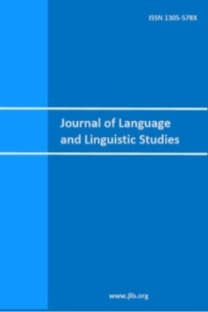A sociolinguistic analysis of slangy expressions in Nigerian pidgin
Öz
Please fill up the following information accurately. (Please
use Times New Roman, 12 pt.
A sociolinguistic analysis of slangy expressions in Nigerian pidgin
This
paper undertakes a sociolinguistic analysis of slangy expressions in Nigerian
Pidgin. The corpus for this study was gotten systematically through participant
observation of conversational discourses in everyday contexts amongst Nigerians
living in the Warri-Ughelli-Sapele axes of Delta State. These linguistic data
were then recorded and transcribed to aid analysis. The study adopted the
Referential theory of Richards and Ogden (1923) in the analysis of data using
the descriptive research methodology. These set of data were from conversations
in football viewing centres, bukas (roadside food vendors), motor-parks,
university campuses, and the market. Slangy expressions as used by presenters
on private radio stations and lyrics of popular Nigerian songs were also
analysed descriptively. A total of thirty-three (33) slangy expressions were
analysed contextually and referentially. The paper ended on the note that every
speaker poses a variety of slangy expressions and tends to choose among them in
accordance with the social situation that calls for their use and that these
expressions are fully intelligible to the speakers. Nigerian pidgin slangy
expressions are a product of social force and the creative use of language by
Nigerians in order to satisfy their communication needs.
Information about Author(s)*
Author 1
Author
(Last name, First name)
Odogwu, Cynthia Nkechinyere Affiliated
institution (University)
Michael and Cecilia Ibru UniversityCountry
NigeriaEmail
address
cynthiaokoro9@gmail.comDepartment
& Rank
Corresponding author (Yes/No)
Write only one corresponding author.
Yes
Author 2
Author
(Last name, First name)
Affiliated
institution (University)
Country
Email
address
Department
& Rank
Corresponding
author (Yes/No)
Author 3
Author
(Last name, First name)
Affiliated
institution (University)
Country
Email
address
Department
& Rank
Corresponding
author (Yes/No)
Author 4
Author
(Last name, First name)
Affiliated
institution (University)
Country
Email
address
Department
& Rank
Corresponding
author (Yes/No)
___
Adeyanju, D. (2007). Slang usage in educated Nigerian English: A sociolinguistic overview. In Adeyanju, D. (Ed.). Sociolinguistics in the Nigerian context. Ile-Ife; Obafemi Awolowo University Press.Balogun, T., A. (2013). In defense of Nigerian pidgin. In Journal of languages and culture 4(5), 90-98.
Bamgbose, A. (1971). The English language in Nigeria. In J. Spencer, (Ed.) The English language in West Africa (pp. 35-48). London: Longman.
Brooks, N. (1969). Language and language learning (2nd ed.). Harcourt: Brace World Inc. Chen, L. (2006). An introduction to linguistics. Jilin: Jilin University Press.
Elugbe B.,O., & Omamor A.P. (1991). Nigerian pidgin: background and prospects. Ibadan: Heinemann Educational Books (Nigeria) Plc.
Hudson, R.,A. (1990). Sociolinguistics. London: Cambridge University Press.
Idiagbon-Abdullahi, M.,S. (2010). The sociolinguistics of Nigerian pidgin English in selected university campuses in Nigeria. In Ife studies in English language, 8(1).
Mufwene, S. S. (2007). Creoles and pidgins. In Carmen Llamy, Mullany Louise & Stockwell Peter (Eds), The Routledge companion to sociolinguistics (pp. 175-184). New York: Routledge.
Muhammad, A. (2016). A classificatory analysis of students slang: a case-study of the university of Maiduguri students. In Journal of linguistics, language and culture 3(1), 46-57.
Olumuyiwa, T.,O. (1989). Language, culture and society. In Bamisaye, T.O. (Ed), Studies in language and linguistics. Ibadan: Montem paperbacks.
Osoba, J., B. (2015). Analysis of discourse in Nigerian pidgin. In Journal of universal language, 16(1), 131-159.
Otagburuagu, E.J., Ogenyi, L.C., & Ezema, P.A. (2013). Language teaching and learning: a functional approach for the ESL practitioner. Enugu: Snaap Press Limited.
Wardhaugh, R. (2006). An introduction to sociolinguistics. 5th ed. UK: Blackwell Publishing.
Yahaya, A. (2010). Hausa slang used on campus: A case study of University of Maiduguri. B.A. Project, University of Maiduguri.
Yanchun, Z & Yanhong F. (2013). A sociolinguistic study of American slang. In Theory and practice in language studies, 3(12), 2209-2213. Finland: Academy Publisher. Web references
Bethany, K. Dumas, and Jonathan, Lighter. Is slang a word for linguists? In American speech 53(5). Pp. 14-15. doi:10.2307/455336. (Accessed May 2017).
National Population Commission (2017) August. www.population.gov.ng (Accessed August 2017).
- ISSN: 1305-578X
- Yayın Aralığı: Yılda 4 Sayı
- Yayıncı: Hacettepe Üniversitesi
Sayıdaki Diğer Makaleler
Dinçay KÖKSAL, Emrah ÖZDEMİR, Gülşah TERCAN, Süleyman GÜN, Emrah BİLGİN
Understanding the linguistic variation in English as a lingua franca among Arab siblings
The development of forms of negation in the acquisition of Turkish
Feedback for writing or writing for feedback?
Comprehension of conversational implicature in an Iranian EFL context: A validation study
Mahmoud SAMAİE, Maha ARİYANMANESH
What do young EFL learners’ written texts tell us about their productive vocabulary knowledge?
Negative polarity, scope of negation and negative phrases in Turkish
Şule GÖKSEL, Anıl RAKICIOĞLU SÖYLEMEZ
Voice onset time as an indicator of interlanguage: Evidence from Turkish-accented English
